For experienced and aspiring roasters alike, the financial hurdles of acquiring a machine and securing a space to install it amount to a serious barrier to entry. It’s hard to do in the first place, it’s hard to walk away from, and yet the tide of micro-roaster start-ups continues to rise around the world. This growth is thanks in part to the variety of roaster-share programs that seem to be blooming like desert cactus flowers after rain. In Moscow, there’s Smart Roaster. In Tokyo, there’s Glitch. Hyperion Coffee in Ypsilanti, Mich., leases time on its roaster to other businesses. And of course in Brooklyn, NY, there are two roaster-share programs: Pulley Collective and City of Saints.
In the ever-expanding coffee universe of Portland, Ore., a store called Mr. Green Beans — a home-roasting and brewing equipment and education resource — has for several years owned a 1996 Probat L12, with which they’ve quietly, behind the scenes, assisted more than a few local coffee-roasting start-ups. As of this summer, the real charge in that Probat is finally dropping to the beat of its own drum. Aspect Coffee Collective has officially gotten a name, a website, and has splintered from the Mr. Green Beans brand to become a public, full-spectrum coffee business incubator in its own right.
The collective offers coffee shop owners and other interested parties not only access to the 25-pound-capacity Probat, but also some basic packaging tools, farm-direct green coffee resources, maintenance and safety training, access to quality control, marketing consultations and more. Long-term members of the collective have access to green coffee storage space on the site of the 2,000-square-foot roastery warehouse, and the collective is working out details to provide access to an SCAA-certified cupping lab.
The Startup Aspect
It’s not that Trevin Miller, co-founder of Mr. Green Beans and now also the Aspect Collective, thinks that every single coffee shop needs to roast its own coffee. “I think that there’s a lot of coffee shop business models that work really well utilizing other people’s coffee,” Miller recently told Daily Coffee News. “I think it’s kind of a case-by-case industry.”
Yet for the shops that struggle to make it work, or are looking to make a change, the Aspect Coffee Collective provides a safe and sustainable route to coffee autonomy. “I do think there are a lot more coffee shops that should be roasting their own coffee,” Miller said. “They’d live much more comfortable lives, and have a much stronger customer base if they were roasting their own coffee.”
Inexperience can be another obstacle for shops that want to get into roasting. In the early days, only experienced roasters were granted time on Mr. Green Beans’ Probat L12, after proving over the course of a few sessions that they could operate and maintain the machine without supervision. As the open-roaster service expanded and started to welcome less experienced roasters, Miller and company started adding education, safety, and maintenance training to the program, without jacking up the fee.
“The original idea behind Aspect was to make it so that smaller coffee shops could become more sustainable,” said Miller. “I wanted to make it as accessible as possible, so I didn’t typically charge a fee for getting people up and running. It was just kind of, for lack of a better term, out of the goodness of my heart. We’re here to help the coffee industry, so I didn’t want to be charging people for every little thing.”
Tanager Coffee is one of the micro roasters that calls Aspect home, and that started off not with a café, but straight to wholesale/retail. “My experience has been awesome,” owner and roaster CJ Speelman told Daily Coffee News. “Trevin is a real visionary when it comes to empowering people in coffee. Without Aspect, it would’ve been really hard for someone like myself to have started my business.”
Every Tuesday, Speelman fires up the L12, which is the only production-size machine he’s ever roasted on. He started with a popcorn popper, then a Fresh Roast, then a Huky 500. He says Trevin mentored him for several months before he got a solid handle on the machine. “I’m definitely still learning the intricacies of roasting,” said Speelman, who’s been on the L12 for about two and half years.
Tanager maintains an online retail presence and several wholesale café clients. Speelman stores his green coffee in the Aspect warehouse and is passionate not only about sourcing directly, but also using his business to achieve charitable goals such as the Las Cruces Project, where coffee is helping rebuild a soccer field in a Salvadoran coffee-farming community. “Working with Trevin at Aspect has empowered me to really follow my dream, and follow my goal for my business.”
Mike Blair, owner of Seven Virtues Coffee Roasters, was one of Aspect’s earliest commercial participators. Now in its ninth year of operation, Seven Virtues was born as a Stumptown account, and a satisfied one. They purchased their equipment through Stumptown, received valuable training, served great coffee and their business did well. Eventually they went the multi-roaster route, which was an exciting way to try different coffees and keep customers engaged, though roasting their own hadn’t entered their minds. “It wasn’t something that I was actively seeking out,” Blair said. “But the opportunity came to me, and I jumped at it.”
For Blair’s café, the transition from wholesale specialty roasted coffee to roasting their own has resulted in some savings, although not an enormous financial boon, per se. For Blair, it’s the precision, personalization, and overall gratification of roasting that are the most welcome elements of the change. “It’s more hands-on, there’s more control,” Blair said. “Sourcing green coffee, roasting it ourselves, it puts us further down the chain. It used to be that in order to get a direct-trade coffee, you had to go to the source. Now they’re coming to us.”
The Green Coffee Aspect
There’s a trend in the direct-trade and exporting segment of the industry for growers and cooperative to bring their own coffees to market, shipping small amounts to select locations for roasters and other buyers to sample and make purchases directly. In order for this to work, someone must receive the beans, organize the cuppings and facilitate the process in a given region. Trevin Miller has cupped and purchased plenty of coffees for sale in tiny increments through Mr. Green Beans. For Aspect roasters, and anyone else buying greens in bulk, he also facilitates this exceptionally convenient form of direct trade, working directly with producers then making arrangements with exporters and importers for shipping and delivery.
“You’re starting to see a lot more farmers, collectives, coops and farming groups ship coffees to the U.S. and then sell them directly to coffee shops and roasters,” explains Miller. “We work with as many of those people as we can find. We have some friends in El Salvador, I work with a cooperative out of Brasil, we’re trying to get a cooperative out of Cameroon, one out of Ethiopia, who ship coffee here to send us samples of those coffees and allow us to set up cuppings for anybody who uses Aspect. We also send it out to other coffee shops in Portland that we work with. We do these group cuppings to help support these farmers and farmer groups that are importing their own coffee.”
This would seem to put Aspect in a good position to pursue coffee importing as an arm of the business — but there’s no intention to go that route for now. “At this point, we don’t have our fingers in the pot at all,” said Miller. “It’s more just providing access for our customers to coffees that are being brought in, and for people that are bringing their coffees in to have access to people that could potentially buy it. Even though it’s our space, our contacts, our effort, our labor, we don’t really pull anything out of it other than getting first crack at some amazing coffees.”
The Cupping Aspect
Licensed Q-grader Michael McIntyre is the Quality Director of Catalyst Coffee Consulting, the multifaceted company with whom the Aspect Collective has partnered for not only the development and management of the existing cupping lab, but access to a full suite of other vital services. “Aspect provides the roaster, coffee storage and community support. Catalyst can help fill in some of the details like implementing QC habits, sourcing green coffee, developing marketing strategies and so on,” McIntyre told Daily Coffee News in an email. “We’re trying to wrap our minds around making it all fit.”
“The nuts and bolts of the Catalyst and Aspect relationship are really hinged on the beautiful synergy that exists in the two models,” McIntyre added. “Trevin and his vision with the Aspect Collective have been integral elements to the Portland roasting community. So many roasting businesses, small and not so small alike, owe a great deal of credit to Trevin providing the platform through Aspect from which to start, operate and thrive. It is an invaluable service.”
The Future of Aspect
While this summer is the dawn of Aspect’s new life as an independent entity, the fundamental roaster-share program has been evolving for over four years. Therefore there’s been plenty of time to imagine the many directions in which the organization might grow, should it be a success. Bigger machines, more equipment, more direct-sourcing opportunities, an online marketplace of Aspect-assisted products — Miller’s got no shortage of ideas for expansion, saying, “The cupping lab, the relationship with importers, all those things get better the bigger we are.”
With so many resources and connections at his disposal, and such a clear and active passion for all things coffee, one can’t help but wonder why Miller and company haven’t started roasting or selling coffee themselves. “I don’t have a big enough ego to want to roast coffee in Portland,” said Miller. “I think there are lots of companies out there that do an amazing job, and I feel no need to compete with them. If somebody has a desire for whatever reason, either they own their own coffee shop or they feel they could do a better job or they just want to create their own identity, we’re happy to help them get going.”
Howard Bryman
Howard Bryman is the associate editor of Daily Coffee News by Roast Magazine. He is based in Portland, Oregon.
Comment
5 Comments
Comments are closed.



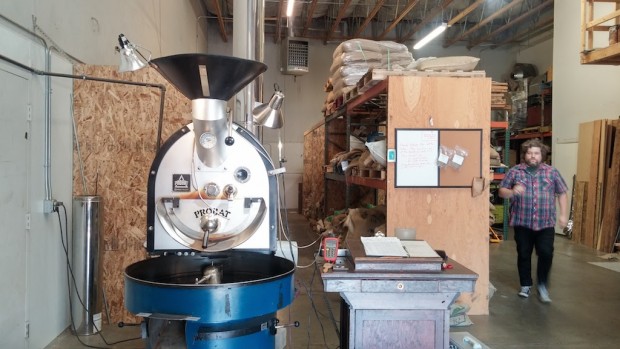
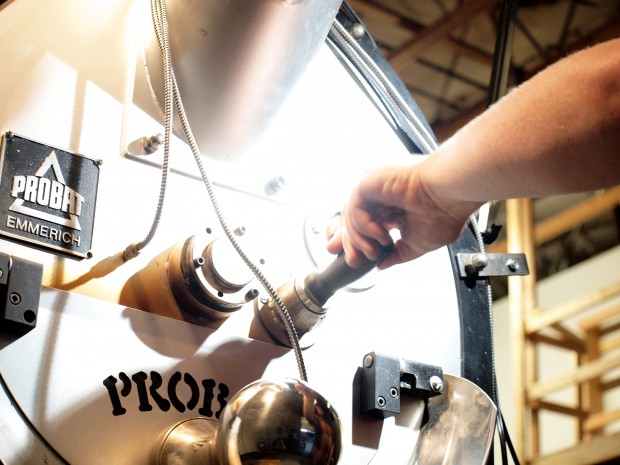
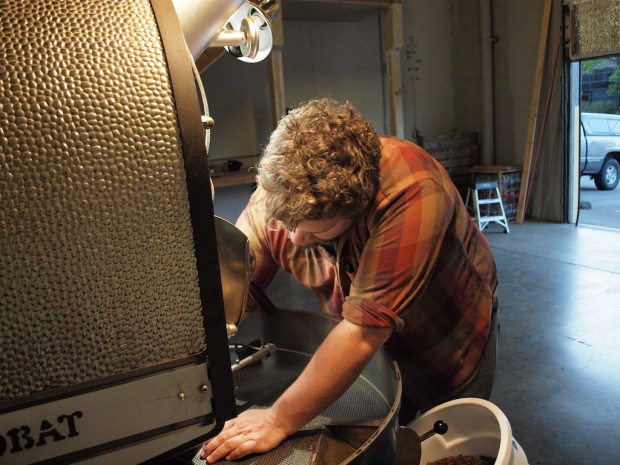
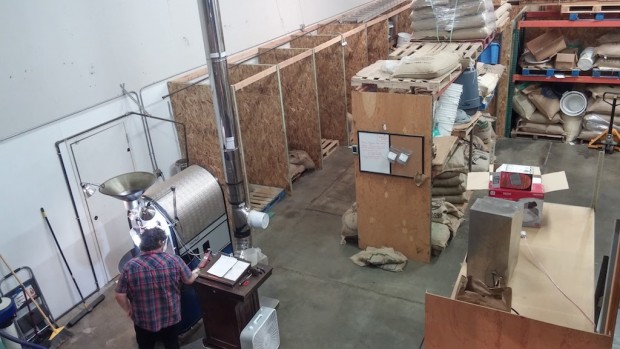
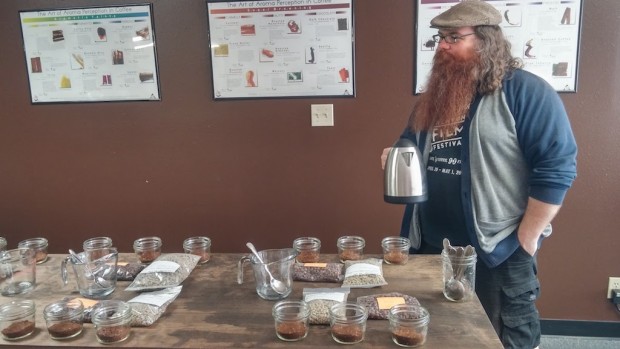



Fantastic article! I’m so excited to see new models of business evolve out of the specialty coffee scene!
Most of the coffee in Portland is under-roasted, green, sour and grassy. Would be nice if someone who actually knew what they were doing would come in and influence a few roasters. Almost every time I get an espresso from almost any shop in PDX, the results are nasty tasting. I know someone who bought some roasted beans from a shop that also teaches people how to become baristas…the beans destroyed his grinder because they were not roasted all the way through. Blind leading the blind? Please note: this is not peculiar to Portland, I’ve found it to be true in Seattle, Austin, SF Bay area, NYC, etc. A pal who’s been roasting commercially for 35 years was in Portland recently (he visits a couple times a year, and we visit various local shops) and said that the generic cup he had at Peet’s was the best cup of coffee he’d had in Portland in 10 years! At SCAA this year, he commented that all the coffee he tried, only that from a famous roaster from NC was not sour and under-roasted. Kids: the need to be at the opposite end of the roasting spectrum from Starbucks is fine, but at least roast the beans all the way! Good luck!
Yeaaaaah. I dunno man. It all tastes pretty fucking good to me.
Keep up the great work Trevin!
This place is such a great idea! I hung out one morning earlier this year with Mark from Intent Roasting when I was visiting Portland and it was such a great idea! I was amazed that most of my favorite roasters use this space. If I had the space, time and $$ I’d be all over this in Kansas City! LOL